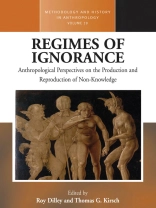Non-knowledge should not be simply regarded as the opposite of knowledge, but as complementary to it: each derives its character and meaning from the other and from their interaction. Knowledge does not colonize the space of ignorance in the progressive march of science; rather, knowledge and ignorance are mutually shaped in social and political domains of partial, shifting, and temporal relationships. This volume’s ethnographic analyses provide a theoretical frame through which to consider the production and reproduction of ignorance, non-knowledge, and secrecy, as well as the wider implications these ideas have for anthropology and related disciplines in the social sciences and humanities.
Mục lục
Introduction: Regimes of Ignorance: An Introduction
Thomas G. Kirsch and Roy Dilley
Chapter 1. Mind the Gap: On the Other Side of Knowing
Carlo Caduff
Chapter 2. Ignoring Native Ignorance: Epidemiological Enclosures of Not-Knowing Plague in Inner Asia
Christos Lynteris
Chapter 3. Managing Pleasurable Pursuits: Utopic Horizons and the Arts of Ignoring and ‘Not Knowing’ among Fine Woodworkers
Trevor H. J. Marchand
Chapter 4. Ignorant Bodies and the Dangers of Knowledge in Amazonia
Casey High
Chapter 5. What Do Child Sex Offenders Know?
John Borneman
Chapter 6. Problematic Reproductions: Children, Slavery and Not-Knowing in Colonial French West Africa
Roy Dilley
Chapter 7. Power and Ignorance in British India: The Native Fetish of the Crown
Leo Coleman
Chapter 8. Secrecy and the Epistemophilic Other
Thomas G. Kirsch
Notes on Contributors
Giới thiệu về tác giả
Roy Dilley is Professor of Social Anthropology at the University of St Andrews. His books include Islamic and Caste Knowledge Practices among Haalpulaaren (2004), Nearly Native, Barely Civilized: Henri Gaden’s Journey Across Colonial French West Africa (2014) and Rencontres photographiques: Henri Gaden, photographe, en Afrique Occidentale, with the Archives nationales d’outre-mer, Aix-en-Provence.












